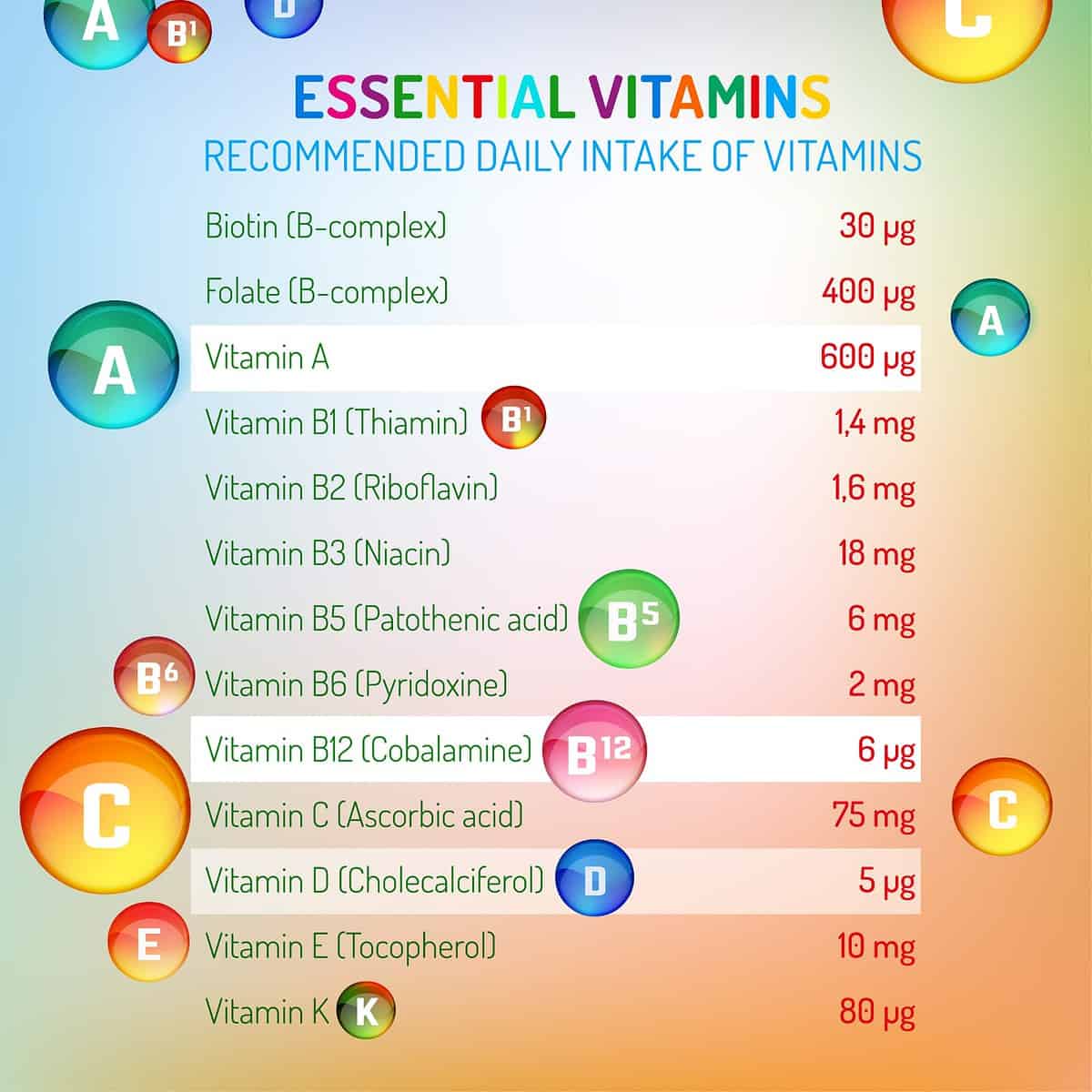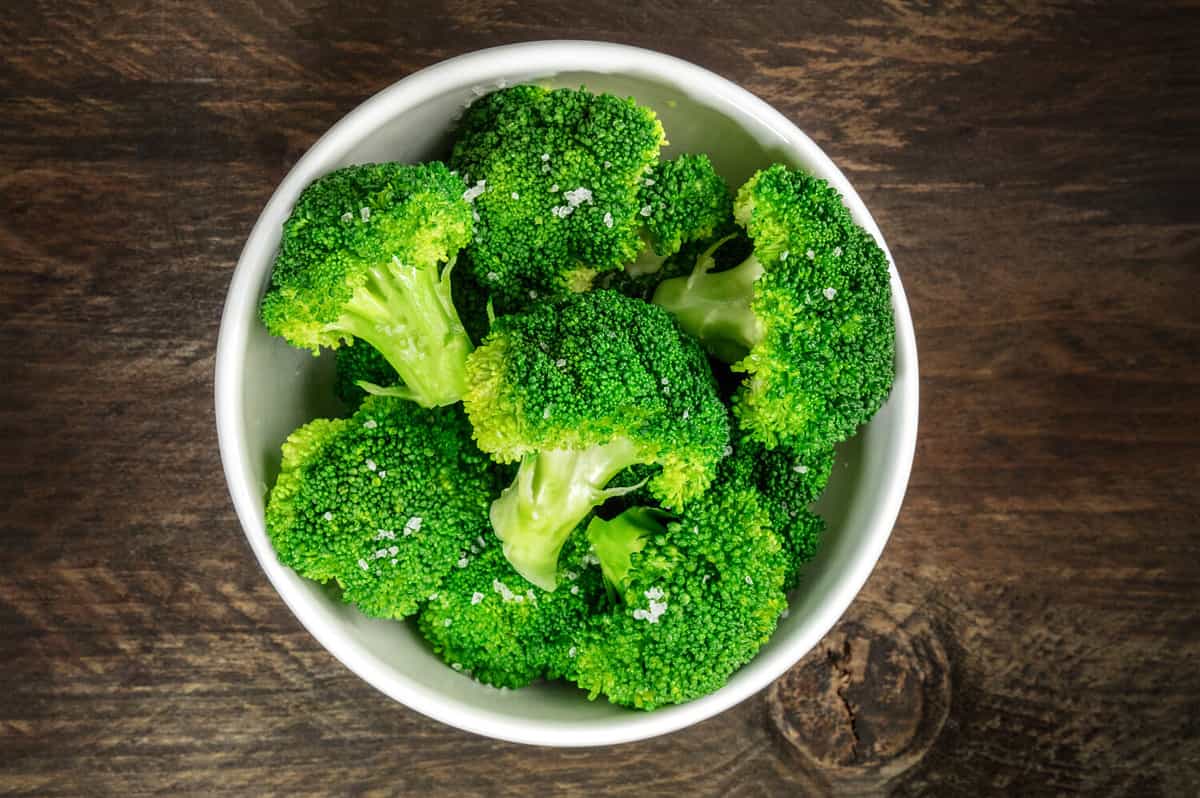No one ever wants to get sick. When it comes to the proper functioning of the body and protection against any ailments, we have no choice but to include essential vitamins in our diet.
These vitamins are referred to as ‘essential’ because the body has no capacity to synthesize them (except for Vitamin D), hence we have no option but to outsource them from food items.
Vitamins are simply organic-based substances produced by either plant or animal products.
To make the best out of accessing a wide variety of essential vitamins to boost our health, we need an approach that focuses more on daily intake in proper amounts. This can only be made possible through creating a simple chart.
Let us talk about some of these essential vitamins in much more detail.

©Double Brain/Shutterstock.com
Essential Vitamins: Recommended Daily Intake of Vitamins
There are 2 types of vitamins: water-soluble vitamins and fat-soluble vitamins.
The water-soluble vitamins category comprises all the B Vitamins and Vitamin C, while the fat-soluble vitamins category comprises Vitamins A, D, E, and K.
It is worth noting that for water-soluble vitamins, the body gets rid of what it does not have the capacity to absorb, while for the fat-soluble ones, the body stores what is in excess, in the liver and the fat tissues, to be utilized later when they are needed.
Biotin (B-complex)
It belongs to the B Vitamins. Its presence in the body aids in the metabolism of fats, carbohydrates, and amino acids-primary protein building blocks.
Function
It is highly recommendable for those experiencing hair loss as well as those who do not have strong nails. It is also good for those experiencing dry skin.
Deficiency Symptoms
It is rare to experience a deficiency of this element. However, in case of deficiency, the body can experience loss of hair, dry scalp, scaly skin, and cracking of the corners of the mouth.
Daily Intake Requirement Range
25-35 mcg
Source
It can be found in large amounts in the egg white. However, trace amounts can also be found in almost all food items.
Folate (B-complex)
B-complex is a B Vitamin also known as Folic acid. It belongs to the class of Vitamin B9. It is recommended for women, especially those who are expectant or those who are anticipating becoming pregnant in the near future.
Function
As explained above, it is good for pregnant or anticipating mothers to prevent spinal complications that come along with childbirth. It is also good for individuals who have blood deficiency (anemic) as well as blood clotting complications.
Conditions like a decrease in memory and depression can be improved significantly through folic acid intake. Besides, those that experience greying at a young age and decreased volumes of hair can benefit by including folate in their diet.
Deficiency Symptoms
When the body lacks enough folic acid, it tends to form very large red blood cells that are dysfunctional.
Due to its association with blood, the body usually experiences extreme fatigue, general weakness, poor vision, ulcers in the mouth, anxiety, and confusion among other symptoms.
Daily Intake Requirement Range
400- 600 mcg
Sources

©Plateresca/Shutterstock.com
Fresh leafy vegetables like spinach and broccoli, liver, and eggs; legumes such as beans, and milk. You can also source folic acid from fruits such as melons, bananas, and citrus. Tomato juice also does the trick.
Vitamin A
Commonly known as retinol, vitamin A is an essential fat-soluble vitamin that is stored in the liver. This vitamin occurs in foods in 2 two forms i.e. retinol – found in foods that are animal-sourced, and carotenoids, which are plant-based, the most common one being beta carotene.
Function
- Vitamin A is popularly known for boosting eyesight, especially for people who are frequently exposed to areas that have low lighting.
- Beta carotene acts as an antioxidant, which plays a role in protecting against cell damage by free radicals. This plays a big role in the ageing process as well as a major inhibitor of some long-term ailments.
- It plays an important role in the proper formation of teeth and bone development.
- It is also recommended for expectant and lactating mothers.
- Studies have also shown that beta-carotene can reduce the risk of cancer.
Deficiency Symptoms
They include night blindness, dryness of the eyes and skin, deformed bones and teeth, and slow growth.
Daily Intake Requirement Range
700-900 mcg
Sources
Excellent sources include carrots, cabbages, milk, leafy vegetables, cheese, fish liver oils, and all colored fruits.
Vitamin B1 (Thiamine)
It is also known as Thiamine. It aids the body to use carbohydrates as a form of energy. You will find it in high concentrations on the outer parts of their sources. The act of either cooking, boiling, or heating, destroys the vitamin. It is combined with other B vitamins when in use.
Function
- It aids in the breaking down of protein and fat.
- It also protects the brain, protecting the nerve cells thereby supporting the nervous system as a whole.
- Also known as an ‘anti-stress’, as it builds the body’s capability of withstanding conditions that are stressful.
- It assists in the proper functioning of the cardiovascular system.
- It also offers protection to the eyes against cataracts.
- It is responsible for the regulation of the production of hydrochloric acid, hence enhancing the proper functioning of the digestive system.
Deficiency Symptoms
Its deficiency can cause loss of memory, hence confusion, muscle weakness, loss of weight, compromised immunity, and loss of coordination.
It can also cause a disease known as Beriberi – characterized by a burning sensation on both hands and feet, a tingling feeling, and also swelling.
Daily Intake Requirement Range
0.9-1.2 mg
Sources

©iStock.com/Yuliia Skybyk
It can be found in green peas, lentils, and beans. It can also be sourced from enriched and fortified cereals. You can also find it in fish and pork as well as yogurt.
Vitamin B2 (Riboflavin)
It is also known as Vitamin B2. Bacteria present in the gut are capable of producing small amounts of the vitamin, but, it is not enough to provide for the daily requirement. It can be found in both animal and plant-based foods.
Function
- It plays a very important role in the proper functioning of the brain and skin development.
- It also plays a vital role in the conversion of carbohydrates into a compound (adenosine triphosphate), which aids in storing energy in the muscles.
- Moreover, it maintains the linings of the digestive tract, keeps the liver healthy as well as takes care of the eyes, skin, nerves, and muscles.
Deficiency Symptoms
Its deficiency can also be termed ariboflavinosis. Its symptoms are almost similar to those of biotin deficiency. It is characterized by inflammation of the tongue and lining of the mouth, cracked lips, private parts like the scrotum experiencing dermatitis, and the eyes being sensitive to light hence becoming itchy, watery, and bloodshot.
Daily Intake Requirement Range
1.1-1.6 mg
Sources
Can be found in plenty in fish, poultry, and meat products, whole grain pastries, vegetables, dairy products, and legumes.
Vitamin B3 (Niacin)
It’s also known as Nicotinamide. Niacin comes in 2 chemical forms: nicotinic acid and nicotinamide. Both can be found naturally in food items and also in supplements
Function
- It reduces the risk of heart attack by improving fat levels in the blood.
- It releases chemicals responsible for widening blood vessels, hence improving the flow of blood, and consequently lowering blood pressure.
- It aids in the normal functioning of the digestive system.
- It plays an active role in boosting brain functioning by providing much-needed energy to the brain.
- It also plays an important role in protecting skin cells against damage by the sun.
Deficiency Symptoms
It is characterized by discoloration of the skin, a bright red tongue, loss of appetite, constipation, and vomiting, memory loss, fatigue, and depression.
Daily Intake Requirement Range
2-18mg
Sources
It can be found in beef, poultry, and beef products. It can also be found in legumes, vegetables, potatoes, nuts, and fortified cereals.
Vitamin B5 (Pantothenic Acid)
It is found in both animal and plant products. Vitamin B5 is not popular because its deficiency is rare.

©Africa Studio/Shutterstock.com
Functions
- Like many of the B vitamins, it is responsible for breaking down fats, proteins, and carbohydrates to energy that will facilitate the restructuring of vital body organs including muscles and vital tissues.
- It is also actively involved in the formation of red blood cells as well as stress and sex-related hormones.
- Vitamin B5 also helps in maintaining the proper functioning of the digestive system.
- Also, its unique moisturizing component boosts the wound healing process thus reducing acne-related complications.
Deficiency Symptoms
Its deficiencies are related to Vitamin B1. However, a person can experience tiredness, nausea, vomiting, numbness, swelling, burning sensations on the feet, depression, stomach pains as well as sleep disorders.
Daily Intake Requirement Range
1.7-7 mg
Sources
It can be found in poultry and animal products e.g. chicken, turkey, pork, liver, and kidney. It can also be sourced from fish, dairy products, vegetables, legumes, whole grains, and cereals.
Vitamin B6 (Pyridoxine)
It is involved in the maintenance of the overall well-being of the body including functioning of the brain, nerves, and the immune system.
Function
- It is actively involved in the production of red blood cells hence reducing incidences of anemia.
- It is associated with brain health, due to its role in the formation of neurotransmitters.
- It also helps to reduce the severity of nausea and morning sickness in expectant mothers.
- With its role in the healthy growth of body cells, it aids in reducing the risk of cancer occurrence.
Deficiency Symptoms
A person with this deficiency will exhibit almost similar symptoms as in B1, B2, B3, and B5.
Daily Intake Requirement Range
1.2-2 mg
Sources
It can be found in fish, liver, starchy vegetables, poultry products, and citrus fruits.
Vitamin B12 (Cobalamine)
Vitamin B12, also known as cobalamin, is a water-soluble vitamin that plays an essential role in the normal functioning of the brain and nervous system, and in the formation of blood. It contains the metal cobalt and is produced by bacteria as they break down nutrients.
Function
It plays a critical role in the formation of red blood cells, cell metabolic processes, proper functioning of the nerves, and DNA formation- cellular molecules carrying genetic information.
Deficiency Symptoms
Its deficiencies are not limited to fatigue, anemia, damage of the nerves, weakened muscles, and intestinal complications. Its deficiency is not quite common. However, vegetarians have a high risk of developing its deficiency because the vitamin does not exist in plant foods. Moreover, the aged and people who have an issue with the digestive tract, which has the responsibility of absorbing the nutrient, are prone to its deficiency.
Daily Intake Requirement Range
1.8-2.6 mcg
Sources
Viable sources include poultry, fish, meat, and dairy products. Also, fortified cereals are a good source.
Vitamin C (Ascorbic Acid)
It is vital for tissue growth in the body. It plays a very vital role in the formation of collagen, a critical protein for making skin, tendons, ligaments cartilage, and blood vessels. Studies have also shown that cigarette smokers pose a higher risk of deficiency.
Function
Protects the body against risks of stroke and heart disease. It lowers the risk of developing high blood pressure because it is rich in antioxidants. There is a strong belief that Vitamin C cures the common cold. However, studies have shown that there is only a reduction in the duration of the cold as opposed to a cure.
Others include maintaining strong teeth and gums, immunity boost, wound healing and lowering blood sugar in diabetic patients, treating some allergic reactions like asthma, and improvement of vision.
Deficiency Symptoms
Bleeding from the gums, inflamed gums (gingivitis), split and dry hair, wounds taking too long to heal, skin becomes dry, scaly, and rough, nose bleeding, and the inability of the body to keep infection off (scurvy).
Daily Requirement Intake
15-90 mg
Sources

©PosiNote/Shutterstock.com
Fruits are rich in ascorbic acid, the most popular ones being oranges, melons, pawpaw, strawberries, mango, etc. It can also be sourced from vegetables like cabbages and cauliflower, as well as leafy greens like spinach.
To make the best out of these sources, they need to be taken either raw or slightly cooked because the vitamin is sensitive to light.
Vitamin D (Cholecalciferol)
The unique thing about this vitamin is that it can be manufactured by our bodies, and we can also supplement it when the levels are low.
Being a fat-soluble vitamin, it is widely known for its ability to absorb and retain calcium and phosphorus minerals – critical components of bone and teeth.
Did you know our bodies will produce vitamin D by simply exposing them to the sun?
Function
It is responsible for boosting the immune system and moods. It also plays a role in promoting weight loss, lowering blood pressure, reducing incidences of heart disease, and lowering the risk of developing type 2 diabetes, as well as rheumatoid arthritis.
Deficiency Symptoms
It is quite severe in children. The symptoms are;
- Compromised growth due to improper development of bones (bowed or bent)
- Weak muscles
- Painful bones
- Deformity in the joints
In adults, it manifested by;
- Tiredness
- Muscle cramps
- Mood swings
- Pain in the bones
Daily Intake Requirement Range
15-20mg
Sources
Fish rich in fats are a good source e.g., Salmon. Also, liver, egg (yolk), milk, cereals, orange juice, and yogurt.
Vitamin E (Tocopherol)
It is another fat-soluble vitamin. In the body, it is stored in the liver and the fatty tissue. It basically helps the body to build a natural defense mechanism against diseases and other infections.
Function
- It helps to build a strong immune system against bacteria and viruses.
- It protects body tissues from damage by free radicals.
- It plays a role in the formation of red blood cells and prevents blood clots in them by widening the blood vessels.
- It provides an enabling environment for cells to interact freely in the body.
- It also aids the body to utilize Vitamin K.
Deficiency Symptoms
It can cause a weakening of the immune system, muscle aches, a feeling of numbness and tingling, and problems with vision.
Daily Intake Requirement Range
11-15 mg
Sources
Can be found in leafy greens like spinach, plant-based oils, nuts, vegetables, and fruits.

©Larina Marina/Shutterstock.com
Vitamin K
Plays a very important role in blood coagulation (blood clotting). It comes in 2 forms;
- Vitamin K 1- found in plant-based foods
- Vitamin K 2- found in animal-based foods
Function
- It plays an important role in blood clotting.
- It also plays a critical role in bone metabolism and heart-related issues.
- K2 is known to be associated more with reduced heart disease risk as opposed to K1.
- With Vitamin K2's active role in the metabolism of bones, it is closely related to preventing the weakening and fracturing of bones.
- It is widely involved in dental health matters.
Deficiency Symptoms
A deficiency of the vitamin will lead to a lack of synthesis of prothrombin – responsible for enabling blood to clot. This will cause excessive bleeding even from minor cuts.
Daily Intake Requirement Range
75-120 mcg
Sources
Vitamin K can be found in leafy vegetables, liver, vegetable oils, tomatoes, and cauliflower.
Conclusion
Every process in our bodies requires essential vitamins and nutrients to function properly. They work in harmony to grow, repair in case of breakdown, heal in case of damage, and maintain all the organs in a functional state. All of them are needed in varying amounts, of which, any deficiencies experienced will lead to a dysfunctional body.
Planning a routine balanced diet means staying healthy. This can be made possible by eating the correct proportions of the foods listed above, getting plenty of water, rest and exercise, and taking care of yourself and your loved ones.
The image featured at the top of this post is ©Creative Cat Studio/Shutterstock.com.
